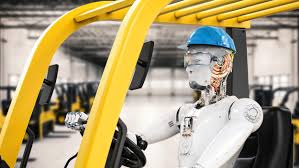Source: fortuneindia.com
When Albert Einstein spoke of how the human spirit must prevail over technology, little did the world know that decades later this statement would hold true for the human race trying its best to stay relevant in the world of ‘Globotics’. This interesting term has kicked up quite a storm recently when globalisation expert Richard Baldwin wrote on the fast-paced effects of digital disruption and the need for humans to adapt to the inevitable transition. In simpler terms, Globotics refers to robotics in times of globalisation. Since liberalization in the late 90s, globalisation has been opening up new avenues in different parts of the world by bringing in innovations and machines into a world that was striving to connect people and products to markets. This has expedited a lot of production, smoothened processes across industries and ensured greater development for most economies.
With artificial intelligence and machine learning ensuring greater efficiency, one can safely say it is also the era of hyper-globalisation. However, every change comes with its set of growing pains. About 25 years back, the world was not ready for social media and virtual lives, and now the world is not yet quite ready to embrace the way technology will conquer everything from our daily chores to jobs. The giant strides taken by technology have been witnessed by the software industry, which has grown by leaps and bounds since globalisation.
Software industry ushers in machine learning
Closer home, in India, globotics has brought in IT industries, software development adding a separate dimension to the way India would collaborate with the world in terms of technology. The software industry has brought in machine learning and like everything, growth and expansion of this industry is happening but at a hefty price. While our world is constantly evolving and being reshaped by technology, one also needs to focus on making digitally challenged organisations more relevant so that they do not fall out of the race. Initially, with the advent of software industries and technological innovations, white-collared people had greatly benefited from the rudimentary robotics. However, over time the pace of change and digital disruption has taken the world by surprise calling for acceptance and adaptation.
The transition
India, as a country known for its IT hubs, has been a huge contributor to the global IT industry. Therefore, the country is going to play a major role in the way the transition and evolution due to automation and machine learning is going to take place. All kinds of jobs in this sector have undergone transitions due to machines taking over human roles and easing out the entire process. For example, earlier, web development used to be a creative job but now it is done easily through simpler programming on the machines. Data analysts, on the other hand, use creativity and human intelligence and will probably never be displaced by machines as they would always be needed to feed algorithm for the machine. The entire process is a vicious cycle where the more analysts are strengthening the algorithm, the more engineers are killing their own jobs. While blue-collared jobs have seen a reasonable amount of automation, white-collared jobs are yet to see a transition into robotics displacing humans.
The transition will primarily follow three steps. Apart from the impact on the economy, the psychological impact will spell frustration among employees of different sectors. This will then take some time to initiate acceptance with automation being an inevitable part of various professions. Along with acceptance will come compliance on ways of using these machines and to know how to make the most of it when combined with human intelligence and talent. For instance, every technical industry should invest in using Artificial Intelligence and Machine Learning to do the high-risk complicated tasks that need not be done by employees. Once this balance is struck between human resources and machines in every organisation, individuals from various vocations might be better prepared to deal with the transition. It will be far easier to thrive in the new world once employees know how to upskill themselves and which faculties will be indispensable in a world of robotics. An example of this is that a therapist’s job cannot be done by a machine and even while medical science advances, doctors will still be required for a certain level of diagnosis and care. Fields of creativity and ethics like that of mental health cannot be replaced by AI algorithms and this should be kept in mind.
The way ahead
It is interesting to note that in a certain way the next generation will be going back to their roots. As the human race continuously move up the value chain in an upward moving cycle, it will be compelled to tap into its creative and emotive side again unlike before when it was upskilling to use machines and becoming mechanical. It is about working together with machines and being indispensable. The trick, therefore, lies in understanding that there will always be some jobs that machines cannot do.
Artificial Intelligence technology was conceived by the human mind and therefore there will be ways in which employees can always make themselves superior and indispensable. While IT and software professionals would need more reskilling and upskilling programmes to stay relevant and climb up the value chain, creativity and ethics will become more important than ever before. The Darwinian theory of survival of the fittest is deemed to hold true in a world where adaptation is the key to success and growth. The future of the workforce will see a paradigm shift which might seem daunting at first but in the end these are all phases of growth demanding everyone to be a stronger and better version of themselves.


